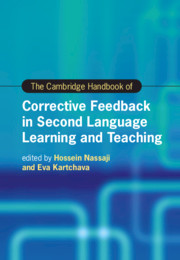Book contents
- The Cambridge Handbook of Corrective Feedback in Second Language Learning and Teaching
- Cambridge Handbooks in Language and Linguistics
- The Cambridge Handbook of Corrective Feedback in Second Language Learning and Teaching
- Copyright page
- Contents
- Figures
- Tables
- Contributors
- Acknowledgments
- Introduction Corrective Feedback in Second Language Teaching and Learning
- Part I Theoretical Perspectives on Corrective Feedback
- Part II Methodological Approaches in the Study of Corrective Feedback
- Part III Different Delivery Modes of Corrective Feedback
- Part IV Feedback Provider, Feedback Intensity, and Feedback Timing
- Part V Corrective Feedback and Language Skills
- Part VI Contexts of Corrective Feedback and Their Effects
- Part VII Learners’ and Teachers’ Feedback Perspectives, Perceptions, and Preferences
- Part VIII Individual Differences, Tasks, and Other Language- and Learner-Related Factors
- 30 Age and Corrective Feedback
- 31 Gender Effects
- 32 Feedback, Aptitude, and Multilingualism
- 33 Corrective Feedback and Affect
- 34 Corrective Feedback, Developmental Readiness, and Language Proficiency
- 35 Corrective Feedback and Grammatical Complexity: A Research Synthesis
- 36 The Role of Task in the Efficacy of Corrective Feedback
- Index
- References
35 - Corrective Feedback and Grammatical Complexity: A Research Synthesis
from Part VIII - Individual Differences, Tasks, and Other Language- and Learner-Related Factors
Published online by Cambridge University Press: 26 February 2021
- The Cambridge Handbook of Corrective Feedback in Second Language Learning and Teaching
- Cambridge Handbooks in Language and Linguistics
- The Cambridge Handbook of Corrective Feedback in Second Language Learning and Teaching
- Copyright page
- Contents
- Figures
- Tables
- Contributors
- Acknowledgments
- Introduction Corrective Feedback in Second Language Teaching and Learning
- Part I Theoretical Perspectives on Corrective Feedback
- Part II Methodological Approaches in the Study of Corrective Feedback
- Part III Different Delivery Modes of Corrective Feedback
- Part IV Feedback Provider, Feedback Intensity, and Feedback Timing
- Part V Corrective Feedback and Language Skills
- Part VI Contexts of Corrective Feedback and Their Effects
- Part VII Learners’ and Teachers’ Feedback Perspectives, Perceptions, and Preferences
- Part VIII Individual Differences, Tasks, and Other Language- and Learner-Related Factors
- 30 Age and Corrective Feedback
- 31 Gender Effects
- 32 Feedback, Aptitude, and Multilingualism
- 33 Corrective Feedback and Affect
- 34 Corrective Feedback, Developmental Readiness, and Language Proficiency
- 35 Corrective Feedback and Grammatical Complexity: A Research Synthesis
- 36 The Role of Task in the Efficacy of Corrective Feedback
- Index
- References
Summary
This chapter reviews corrective feedback studies that focused on the effectiveness of oral corrective feedback on specific morphosyntactic targets in English as a second language. Specifically, this chapter addressed the question of whether the grammatical complexity of the target structure investigated affects the effectiveness of corrective feedback as an instructional intervention. Not only was complexity defined on the basis of formal criteria, but it also incorporated a semantic component from the perspective of the redundancy and transparency of the form–meaning mapping. Eleven studies published between 2006 and 2018 qualified for the research synthesis. The overall findings indicated that, in general, corrective feedback is more effective for simpler grammatical features. The chapter concludes that type of language feature is a relevant dimension to consider in the effectiveness of corrective feedback. The chapter calls for future research on the role of grammatical complexity using categorization methods that consider both formal and semantic complexity features.
Keywords
- Type
- Chapter
- Information
- The Cambridge Handbook of Corrective Feedback in Second Language Learning and Teaching , pp. 754 - 776Publisher: Cambridge University PressPrint publication year: 2021

